Top Ways You Can Enhance Pool Water Quality
Owning a pool is a dream come true for many homeowners. It provides a perfect escape from the sweltering heat, a fun spot for family gatherings, and a serene place to unwind. However, along with the joys of pool ownership comes the responsibility of maintaining high-quality pool water. This ensures not only a safe and pleasant swimming experience but also extends the life of your pool. In this comprehensive guide, we will explore various ways to enhance your pool water quality, making sure you enjoy a crystal-clear swim every time.
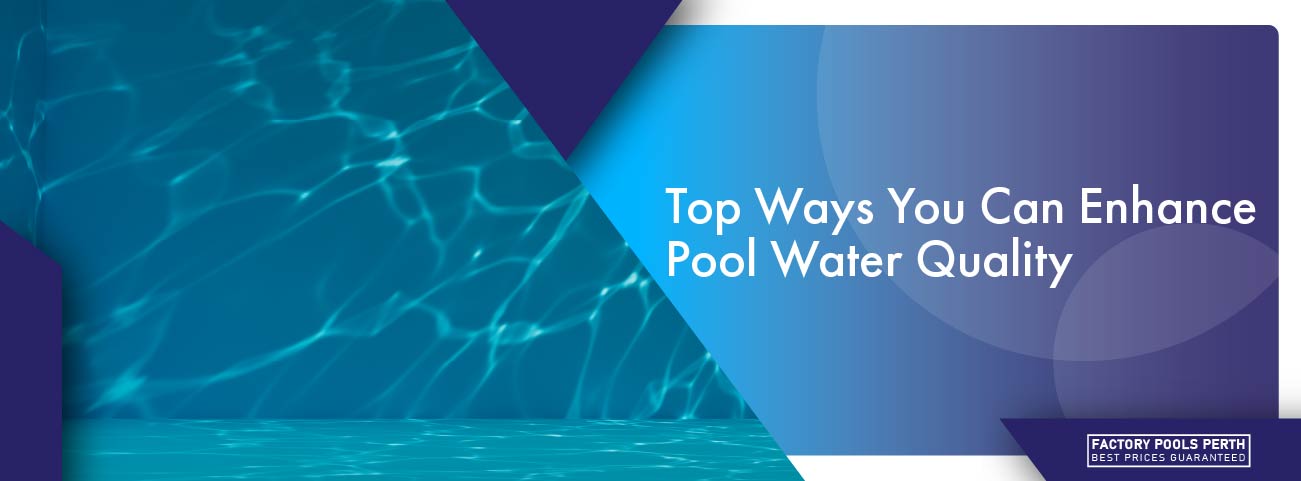
Understanding Pool Water Quality
Factors Affecting Pool Water Quality
Maintaining your pool’s water quality involves more than just scooping out leaves. Several factors come into play, each affecting the clarity and safety of the water.
- pH Levels: The pH level of your pool water is crucial. It measures how acidic or alkaline your water is on a scale from 0 to 14. Ideally, pool water should have a pH level between 7.2 and 7.6. Levels outside this range can cause skin irritation, damage to pool equipment, and reduced effectiveness of chlorine.
- Chlorine: Chlorine is essential for disinfecting your pool water, killing harmful bacteria and pathogens. However, too much chlorine can cause eye irritation and a strong odour, while too little can lead to algae growth and murky water.
- Filtration: A good filtration system removes debris, dirt, and other contaminants from the water. It’s important to ensure your filter is clean and functioning optimally.
Common Issues with Pool Water
Even with regular maintenance, pool owners often encounter common water quality issues. Understanding these can help you address them effectively.
- Cloudy Water: Often caused by improper pH levels, inadequate filtration, or insufficient chlorine. Cloudy water not only looks uninviting but can also harbour bacteria.
- Algae Growth: This occurs when chlorine levels are too low, or if the pool has been exposed to excessive sunlight. Algae can turn your pool green and slippery.
- Scaling and Staining: Hard water or imbalanced minerals can lead to scaling on pool surfaces and equipment, while metals like iron and copper can cause unsightly stains.
Top Ways to Enhance Pool Water Quality
Regular Maintenance and Cleaning Schedule
- Skimming and Scrubbing: Regularly skimming the surface of your pool to remove leaves and debris is essential. Additionally, scrubbing the sides and bottom of the pool prevents algae buildup and keeps the surfaces clean.
- Vacuuming: Invest in a good pool vacuum and use it weekly. This helps in removing dirt and debris that settle at the bottom of the pool, which skimming might miss.
- Filter Maintenance: Clean your pool’s filter regularly to ensure it operates efficiently. Depending on the type of filter (cartridge, sand, or diatomaceous earth), follow the manufacturer’s recommendations for cleaning and replacement.
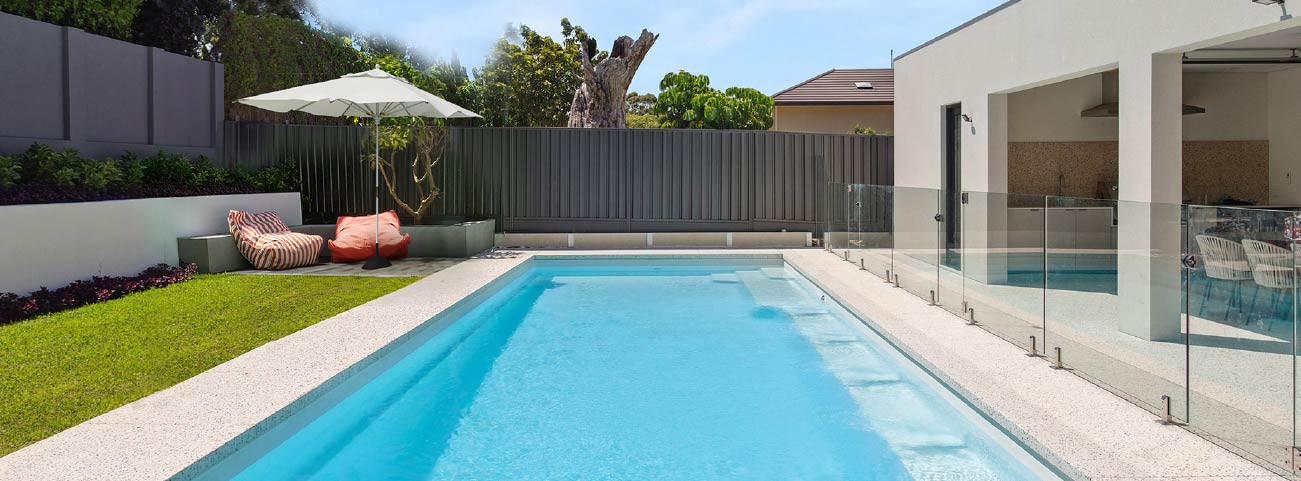
Using the Right Chemicals and Equipment
- Chlorine Management: Test chlorine levels frequently and adjust as necessary. Use high-quality chlorine products and consider using stabilised chlorine to maintain consistent levels.
- pH Balancers: Keep a close watch on the pH levels and use pH increasers or decreasers to maintain the ideal range. Test kits or digital pH metres can provide accurate readings.
- Shock Treatments: Regularly “shocking” your pool, which involves adding a large dose of chlorine, helps in removing contaminants and maintaining water clarity. This should be done every 1-2 weeks or after heavy usage.
Proper Circulation and Filtration Importance
- Pump Operation: Ensure your pool pump runs for at least 8-12 hours a day. This keeps water circulating, helping distribute chemicals evenly and pushing debris towards the filter.
- Return Jets: Adjust your return jets to create a circular water flow pattern. This improves circulation and ensures that all areas of the pool receive adequate filtration.
- Filter Backwashing: Regularly backwash sand and diatomaceous earth filters to remove trapped dirt and debris, ensuring optimal filtration performance.
Tips for Monitoring and Balancing pH Levels
- Frequent Testing: Test your pool water at least twice a week. Use reliable test kits or digital metres for accurate readings of pH levels, chlorine, and other chemicals.
- Record Keeping: Maintain a log of test results and chemical additions. This helps in identifying patterns and making necessary adjustments to maintain balanced water chemistry.
- Professional Help: Occasionally, have a pool professional test your water and provide recommendations. They can detect issues that might go unnoticed with home testing kits.
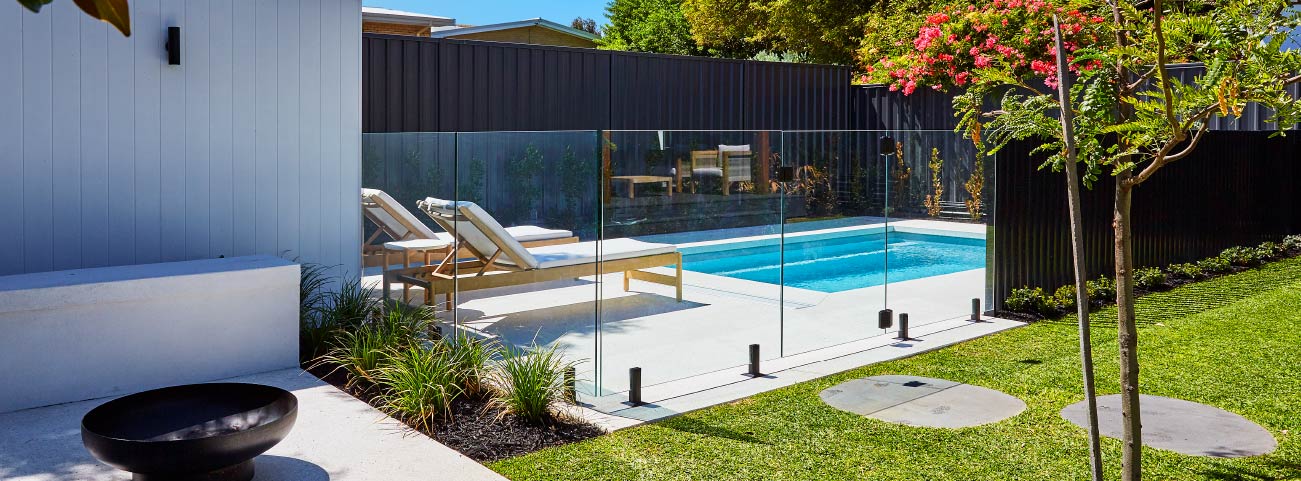
Advanced Techniques for Superior Water Quality
Utilising Modern Pool Management Technology
- Smart Sensors: Invest in smart pool sensors that continuously monitor water quality and send alerts to your smartphone. This helps in proactive management and timely interventions.
- Automated Chemical Dispensers: Automated dispensers adjust chemical levels in real-time, ensuring consistent water quality without the need for constant manual testing and adjustments.
- UV and Ozone Systems: These advanced systems kill bacteria and viruses, reducing the reliance on chlorine and providing a healthier swimming environment.
Investing in Energy-Efficient Pumps and Filters
- Variable Speed Pumps: Upgrade to variable speed pool pumps that are more energy-efficient and provide better water circulation. They save energy costs while maintaining optimal pool conditions.
- High-Efficiency Filters: Consider high-efficiency cartridge filters that capture finer particles and require less frequent cleaning compared to traditional filters.
- Energy Star Rated Equipment: Look for Energy Star-rated pool equipment. These products meet strict energy efficiency guidelines, which can lead to significant savings over time.
Incorporating Natural Pool Cleaning Methods
- Natural Pool Plants: Incorporate aquatic plants in and around your pool. They act as natural filters, absorbing nutrients and reducing algae growth.
- Biofilters: Biofilters use beneficial bacteria to break down contaminants, providing a natural and eco-friendly way to maintain water quality.
- Mineral Systems: Use mineral sanitizers that release natural substances like copper and silver to kill bacteria and algae, reducing the need for chemical additives.
Maintaining high-quality pool water is essential for an enjoyable and safe swimming experience. By understanding the key factors that affect water quality, implementing regular maintenance routines, and leveraging advanced technologies, you can keep your pool crystal clear and inviting. Furthermore, professional maintenance services play a crucial role in ensuring long-term water quality and preventing major issues.
We hope this guide has provided you with valuable insights and practical tips for enhancing your pool water quality. If you have any questions or need further assistance, don’t hesitate to consult a professional. Share this post with other pool owners to help them enjoy their pools to the fullest. Dive into crystal-clear waters and make the most of your swimming oasis!
Top Ways You Can Enhance Pool Water Quality
Owning a pool is a dream come true for many homeowners. It provides a perfect escape from the sweltering heat, a fun spot for family gatherings, and a serene place to unwind. However, along with the joys of pool ownership comes the responsibility of maintaining high-quality pool water. This ensures not only a safe and pleasant swimming experience but also extends the life of your pool. In this comprehensive guide, we will explore various ways to enhance your pool water quality, making sure you enjoy a crystal-clear swim every time.
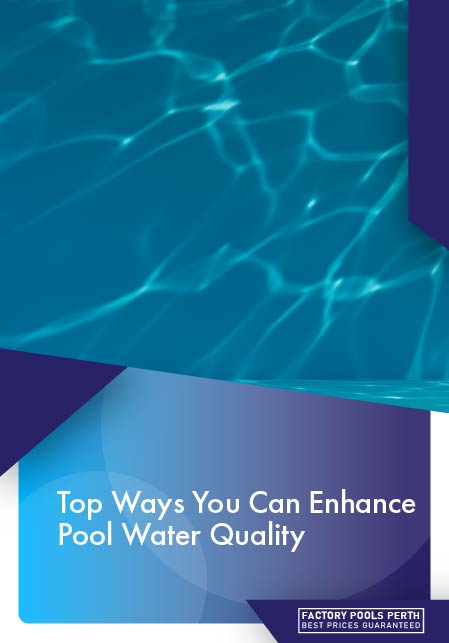
Understanding Pool Water Quality
Factors Affecting Pool Water Quality
Maintaining your pool’s water quality involves more than just scooping out leaves. Several factors come into play, each affecting the clarity and safety of the water.
- pH Levels: The pH level of your pool water is crucial. It measures how acidic or alkaline your water is on a scale from 0 to 14. Ideally, pool water should have a pH level between 7.2 and 7.6. Levels outside this range can cause skin irritation, damage to pool equipment, and reduced effectiveness of chlorine.
- Chlorine: Chlorine is essential for disinfecting your pool water, killing harmful bacteria and pathogens. However, too much chlorine can cause eye irritation and a strong odour, while too little can lead to algae growth and murky water.
- Filtration: A good filtration system removes debris, dirt, and other contaminants from the water. It’s important to ensure your filter is clean and functioning optimally.
Common Issues with Pool Water
Even with regular maintenance, pool owners often encounter common water quality issues. Understanding these can help you address them effectively.
- Cloudy Water: Often caused by improper pH levels, inadequate filtration, or insufficient chlorine. Cloudy water not only looks uninviting but can also harbour bacteria.
- Algae Growth: This occurs when chlorine levels are too low, or if the pool has been exposed to excessive sunlight. Algae can turn your pool green and slippery.
- Scaling and Staining: Hard water or imbalanced minerals can lead to scaling on pool surfaces and equipment, while metals like iron and copper can cause unsightly stains.
Top Ways to Enhance Pool Water Quality
Regular Maintenance and Cleaning Schedule
- Skimming and Scrubbing: Regularly skimming the surface of your pool to remove leaves and debris is essential. Additionally, scrubbing the sides and bottom of the pool prevents algae buildup and keeps the surfaces clean.
- Vacuuming: Invest in a good pool vacuum and use it weekly. This helps in removing dirt and debris that settle at the bottom of the pool, which skimming might miss.
- Filter Maintenance: Clean your pool’s filter regularly to ensure it operates efficiently. Depending on the type of filter (cartridge, sand, or diatomaceous earth), follow the manufacturer’s recommendations for cleaning and replacement.
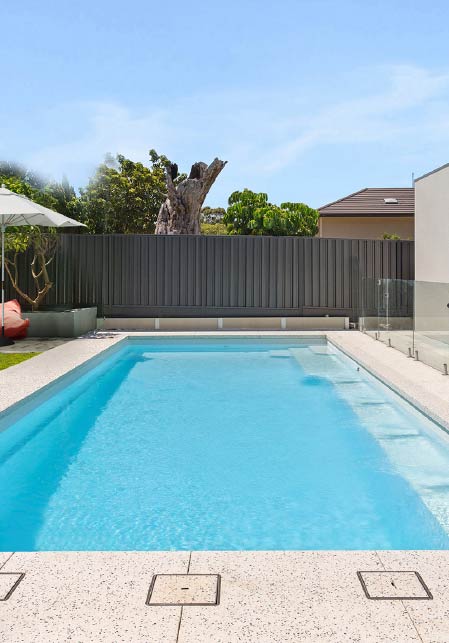
Using the Right Chemicals and Equipment
- Chlorine Management: Test chlorine levels frequently and adjust as necessary. Use high-quality chlorine products and consider using stabilised chlorine to maintain consistent levels.
- pH Balancers: Keep a close watch on the pH levels and use pH increasers or decreasers to maintain the ideal range. Test kits or digital pH metres can provide accurate readings.
- Shock Treatments: Regularly “shocking” your pool, which involves adding a large dose of chlorine, helps in removing contaminants and maintaining water clarity. This should be done every 1-2 weeks or after heavy usage.
Proper Circulation and Filtration Importance
- Pump Operation: Ensure your pool pump runs for at least 8-12 hours a day. This keeps water circulating, helping distribute chemicals evenly and pushing debris towards the filter.
- Return Jets: Adjust your return jets to create a circular water flow pattern. This improves circulation and ensures that all areas of the pool receive adequate filtration.
- Filter Backwashing: Regularly backwash sand and diatomaceous earth filters to remove trapped dirt and debris, ensuring optimal filtration performance.
Tips for Monitoring and Balancing pH Levels
- Frequent Testing: Test your pool water at least twice a week. Use reliable test kits or digital metres for accurate readings of pH levels, chlorine, and other chemicals.
- Record Keeping: Maintain a log of test results and chemical additions. This helps in identifying patterns and making necessary adjustments to maintain balanced water chemistry.
- Professional Help: Occasionally, have a pool professional test your water and provide recommendations. They can detect issues that might go unnoticed with home testing kits.
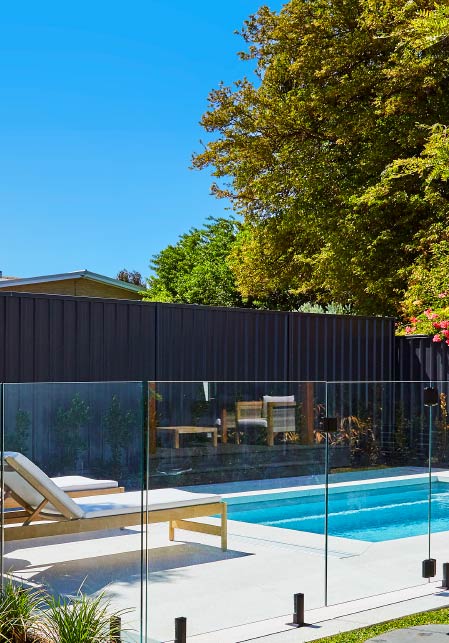
Advanced Techniques for Superior Water Quality
Utilising Modern Pool Management Technology
- Smart Sensors: Invest in smart pool sensors that continuously monitor water quality and send alerts to your smartphone. This helps in proactive management and timely interventions.
- Automated Chemical Dispensers: Automated dispensers adjust chemical levels in real-time, ensuring consistent water quality without the need for constant manual testing and adjustments.
- UV and Ozone Systems: These advanced systems kill bacteria and viruses, reducing the reliance on chlorine and providing a healthier swimming environment.
Investing in Energy-Efficient Pumps and Filters
- Variable Speed Pumps: Upgrade to variable speed pool pumps that are more energy-efficient and provide better water circulation. They save energy costs while maintaining optimal pool conditions.
- High-Efficiency Filters: Consider high-efficiency cartridge filters that capture finer particles and require less frequent cleaning compared to traditional filters.
- Energy Star Rated Equipment: Look for Energy Star-rated pool equipment. These products meet strict energy efficiency guidelines, which can lead to significant savings over time.
Incorporating Natural Pool Cleaning Methods
- Natural Pool Plants: Incorporate aquatic plants in and around your pool. They act as natural filters, absorbing nutrients and reducing algae growth.
- Biofilters: Biofilters use beneficial bacteria to break down contaminants, providing a natural and eco-friendly way to maintain water quality.
- Mineral Systems: Use mineral sanitizers that release natural substances like copper and silver to kill bacteria and algae, reducing the need for chemical additives.
Maintaining high-quality pool water is essential for an enjoyable and safe swimming experience. By understanding the key factors that affect water quality, implementing regular maintenance routines, and leveraging advanced technologies, you can keep your pool crystal clear and inviting. Furthermore, professional maintenance services play a crucial role in ensuring long-term water quality and preventing major issues.
We hope this guide has provided you with valuable insights and practical tips for enhancing your pool water quality. If you have any questions or need further assistance, don’t hesitate to consult a professional. Share this post with other pool owners to help them enjoy their pools to the fullest. Dive into crystal-clear waters and make the most of your swimming oasis!



